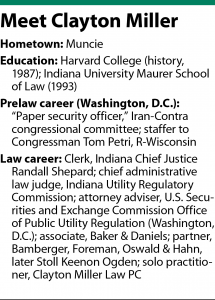Subscriber Benefit
As a subscriber you can listen to articles at work, in the car, or while you work out. Subscribe Now As he prepares for his term as president of the Indiana State Bar Association, solo practitioner Clayton Miller is being strategic.
As he prepares for his term as president of the Indiana State Bar Association, solo practitioner Clayton Miller is being strategic.
More specifically, Miller is thinking about the ISBA’s new strategic plan, which he will be tasked with helping to implement as president of the state bar, a position he’ll assume Oct. 15. Miller will also lead the bar through the ongoing challenges of the COVID-19 pandemic, and he wants to address other big-picture issues impacting Hoosier legal professionals.
Miller is no stranger to bar leadership. Going back to his days with the Indiana Utility Regulatory Commission in the 1990s, he answered a call to join the Improvements in the Judicial System Committee and the Membership and Membership Benefits Committee, both of which he eventually chaired.
Miller, who now practices at Clayton Miller Law PC, has also been a leader of the Utility Law Section. Additionally, he’s been a member of the board of the Indiana Bar Foundation and has served on the ISBA Board of Governors, a role that also placed him on the board of the Indianapolis Bar Association.
He would eventually be nominated for ISBA vice president, leading to roles as president-elect and, now, president.
“(Miller) is not only a phenomenal lawyer, he is also a good friend,” outgoing ISBA President Michael Tolbert said. “He’s a tremendous leader. The bar should really be excited about Clay’s tenure and the presidents following him that come from the same mold.”
Miller recently spoke with Indiana Lawyer about his plans for his year as ISBA president. A portion of that conversation, edited for space, is printed below. The full conversation is available here.
IL: When did you first get involved with the ISBA?
Miller: I think it goes all the way back to my time at the IURC. Back then and still today the ISBA has a very active Utility Law Section, and among other things, that section organizes our two annual CLE programs and does some other things regularly for the utility bar. And then, also early on when I was still at the commission, I answered a call for members of different committees of the state bar, and the president at the time appointed me to two different committees, which I got involved in. The Improvements in the Judicial System Committee, I’ve not been on that committee for more than a decade probably. The other committee was the Membership and Membership Benefits Committee. The vice president of the state bar serves as the chair of the Membership Committee — I think that’s going to change, but historically that’s been the case. So when I was vice president of the state bar I was chair of the Membership Committee, and I just stepped off last year when I became president-elect and there was a new vice president.
What are your goals/plans for your year as ISBA president?
The main role I want to play is to support the overall direction and reinforce the new strategic plan that we’ve just been going through adopting as a board. That was a document that was developed with a lot of input not just from the many different perspectives on our board of governors, but through surveys of our membership and even some attempts to get feedback from attorneys of the state who are not members of the state bar association.
I would say that apart from the focus on the strategic plan, I do think that there’s going to need to be some continued attention to the ongoing fallout from the pandemic. COVID-19 is unfortunately not behind us, and I think this past year the ISBA was able to serve as a fairly vital resource not just for attorneys in the state but for courts, as well. I want to make sure the bar continues to be a relevant resource for different constituencies as we continue to navigate that.
Aside from COVID, do you foresee other challenges in the year ahead?
I do think of two different buckets of challenges. One is the more nitty-gritty challenges for legal practitioners that might have any number of practical components to them. We’re not over the challenges of, “How do lawyers more efficiently provide legal services and ensure that the services that we provide are accessible?”
Access to justice is right in our mission statement, and that has had some particular challenges under COVID, but there are other parts of that that have nothing to do with the pandemic. I think the profession may still face some external challenges in terms of business models. Are there changes coming down the pike that include a more artificial intelligence delivery of legal services? What are the pros and cons of those developments?

The second bucket I would put in the very broad category of promoting the rule of law. I think lawyers and certainly courts have had some particular — I think I can even say unique — challenges this past year with the legitimacy of some of our structures. How do we maintain public faith in the legal system? I don’t have the answers to that, but I want the bar as the voice of the profession to not be indifferent to those conversations and to be in a position to try to convene different perspectives and, ultimately, be a force for positive acceptance of the rule of law.
I link that to what I consider to be the very proud tradition of the ISBA, going back to the 20s and 30s, when we were at times a lonely voice speaking out to condemn the influence of the Ku Klux Klan in Indiana. That was not necessarily a popular position to take, but I think it was both the right decision and a necessary decision that is consistent with our values as lawyers, consistent with our oath we took as lawyers and consistent with the mission of the ISBA.
Do you plan to address the issue of diversity in the legal profession?
One of the four areas of focus of our new strategic plan is equity and inclusion. One of my roles many years ago on the Membership Committee was, I was one of the two co-authors of our diversity statement for our state bar. We very consciously took a broad view of “diverse” so that we were not talking only about racial diversity — although that is a key, and perhaps the most important aspect, but not the only aspect of diversity. Having those diverse inputs makes us stronger, makes us better lawyers, makes us better as an organization. I’d say not only is it an ongoing challenge, but it’s a matter of renewed focus, especially under the new strategic plan.
How has the ISBA benefited your career?
The most immediate impact that I’ve received is probably through the Utility Law Section, first when I worked at the utility commission and then when I was at Baker & Daniels on the utility team. That still is the majority of my practice. It’s not just, “Well, here’s what this order did from the IURC.” We try to also look at the bigger picture, and we have occasionally been involved in some advocacy. Our programming attracts not just the lawyers themselves but the commissioners and the administrative law judges at the utility commission.
What would you say to convince another lawyer to join the ISBA?
I would ask them about their practice area, because one of the great values the ISBA provides is a community of other lawyers in your practice area. We’ve got really wonderful Listservs that are a great source, especially for younger lawyers to be able to tap free advice from other ISBA members in their field. There’s no better place to network with other lawyers across the state. I would also note that whether they join or not, they are benefiting from the ISBA and its advocacy at the Statehouse. And then finally, on an even more practical level, we do have a fairly robust legal search engine that is provided as part of your membership to easily save you more than the cost of your dues just on legal research fees.•
Please enable JavaScript to view this content.
